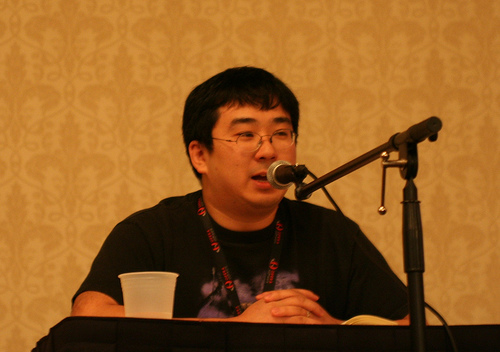This is my response to the
MSNBC article in which I was quoted. Or more accurately, this is my response to the
Anime World Order podcast episode which includes their response to the MSNBC article:
Hey guys,
Lawrence Eng here. By the way, I live in San Diego now. I just wanted to comment on the MSNBC article discussion.
After all the protests about
Patrick being misquoted and things being taken out of context, how about a little benefit of the doubt regarding the other quotes/interviewees?
I stand by my quotes in the article (and feel they contributed positively), but I wasn't paraphrased completely accurately regarding the demographic of people attending early anime cons in the US.
Ignoring for now the simple fact that what even counts as the first anime con(s) is debatable
*, I only started con-going in 1996 (not counting a Robotech Creation convention around 1986 or so I went to as a kid), so I don't claim to have perfect demographic data regarding who went to every early con.
For a better idea of what I actually said, referring to my personal experiences as a fan, rewind to an article (by Jeff Yang) that was published 3 years ago in SFGate:
The fan mix isn't just getting younger -- it's also getting more diverse. Lawrence Eng, a doctoral candidate at Renssaeler Polytechnic Institute who's made the anime fan community the primary focus of his research, remembers the era when he first became a fan, back in the early '90s. "When I first started going to conventions, everyone looked like me: males in their late 20s and 30s, a lot of them Asian," he says. "Now at AX, there are so many women there; they make up at least 50 percent of the attendees, maybe more. And you have people from every race and background. It's become much more of a normal distribution now."
http://www.sfgate.com/cgi-bin/article.cgi?file=/gate/archive/2005/07/07/apop.DTL
Regarding the "colossal factual errors", I know we should hold MSNBC to higher standards than your typical blog post, but some of the errors seem fairly minor considering the level of fan outrage I've been observing.
I agree that the clarity of the Gurren Lagann/Overfiend sentence was problematic, but when interpreted correctly (re: adjective agreement, as you discussed), it's not strictly an error.
Lolicom was incorrectly described as coming from "lolita" and "comics", but the section heading it was discussed under was called "Lolita-complex culture". Based on that, it could have been a minor slip-up during the editing process, and not poor research.
Regarding otaku as "techno-geeks": Some of the earliest, widely published writing on otaku in the English language was the
Greenfeld Wired article you mentioned, itself heavily influenced by
Volker Grassmuck's essay on otaku which was written even before Otaku no Video put the word "otaku" on the radar of American fandom. Whether or not you agree with their description of otaku, it's not incorrect to say that was how otaku were written and thought about in the early 90s, and the term has now evolved into something a lot less academic and much more widespread.
Long story short: talking about otaku in terms of technology (especially IT and mass media) is not a new thing. William Gibson, in particular, really ran with that idea, describing otaku as "pathological-techno-fetishist-with-social-deficit" in
Idoru (1996) and really getting deep into otaku infophile behavior in
Pattern Recognition (2003).
Given how many people have expressed outraged regarding the 'lolicom comes from lolita comics' thing, is it really a huge stretch for anyone to think that anime and manga in America is somehow affecting people's "attitudes about sexual expression"? I mean, before anime and manga were popular here, how many Americans would even know what lolicon is? Now, we have a vocal subset of fans who know the etymology of the term, distinguish between lolicon and shotacon, wonder why the author didn't talk about yaoi/yuri, etc. In that light, Patrick's final quote isn't that off. There
is something powerful going on when kids are consuming media products from another culture. Even if that content isn't always (or even usually) sexually explicit, people are being exposed (in a generally positive way, I would add) to norms and values that are often different from the American mainstream. If it wasn't different, I don't think we as fans would be as interested in the content.
Notes
*How do we define "anime convention"? How many anime fans gathering constitutes an anime convention (versus a club meeting)? When talking about "the first anime convention", do we count the first C/FO meetings? Video rooms at sci-fi cons (like at BayCon in the late 80s)? Yamatocon (which I believe was pretty specific in its scope)? A-Kon (which wasn't a full-blown anime con until after AnimeCon, according to some)? AnimeCon '91? Since it's all a matter of definition, the debate continues. For example, Fred Patten defended his statement about AnimeCon being "the first all-anime convention" in the US (see his collection of essays: Watching Anime, Reading Manga, pp. 81-82).


 Over the next few days, I will be blogging fairly regularly while I'm at
Over the next few days, I will be blogging fairly regularly while I'm at